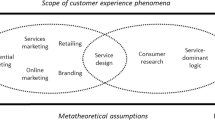Abstract
Within discourse theory, language is seen as constitutive of reality. Furthermore, facts and values are viewed as inseparable. This has consequences for business ethics. In this paper the relationship between discourse theory and business ethics is discussed. Both the descriptive and prescriptive aspects of business ethics are taken into account. Furthermore, an example of an empirical study is presented. A discourse analysis is conducted to answer the questions of how bankers in Holland conceptualize and thus treat their customers and whether there are differences between the largest three banks. The article contains the description of five different discourses on customers within the banks.
Similar content being viewed by others
References
Brown, S. R.: 1980, Political Subjectivity (New Haven, London).
Centraal Bureau voor de Statistiek: 1998, Gebieden in Nederland, 1998 (Voorburg/Heerlen).
Combes, Cherry, David Grant, Tom Keenoy and Cliff Oswick (editors): 2000, Organizational Discourse: Word-views, Work-views and World-views (KMPC, London).
Cowton, C. and R. Crisp: 1998 (Oxford University Press, Oxford).
Dalen, A. A. and C. J. van Gelderen: 1998, In haar maatschappelijk functioneren is de Rabobank anders! Wens of werkelijkheid? (internal publication).
Doig, A. and J. Wilson: 1998, ‘The Effectiveness Of Codes Of Conduct', Business Ethics: A European Review 7, 140–149.
Dryzek, J. S. and M. L. Clark and G. McKenzie: 1989, ‘Subject and System in International Interaction', International Organization 43, 475–505.
Dryzek, J. S.: 1990, Discursive Democracy: Politics, Policy and Political Science (Cambridge University Press, Cambridge).
Dryzek J. S. and J. Berejikian: 1993, ‘Reconstructive Democratic Theory', American Political Science Review 87, 48–88
Durning D. and W. Osuna: 1994, ‘Policy Analysts’ Orientations: An Empirical Investigation Using Q Methodology', Journal of Policy Analysis and Management 13, 629–657.
van Eeten, M. J. G.: 1998, Dialogues of the Deaf: Defining New Agendas for Environmental Deadlocks (Eburon, Delft).
Foucault, M., edited by P. Rabinow: 1984, The Foucault Reader (Penguin Books, London).
Hackley C. E. and Ph. J. Kitchen: 1999a, ‘Ethical Perspectives on the Postmodern Communications Leviathan', Journal of Business Ethics 20, 15–26.
Hackley, C. E.: 1999b, ‘The Meaning of Ethics in and of Advertising', Business Ethics: A European Review 1, 37–42.
Hawkes, T.: 1998, ‘Scoring an own Goal? Ethical Issues in the U.K. Professional Soccer Business', Business Ethics: A European Review 1, 37–47.
Kaptein, M.: 1988, Ethics Management (Kluwer Academic Publishers, Dordrecht).
Liljander, V. and T. Stranvik, 1995, ‘The Nature of Customer Relationships in Services', Advances in Services Marketing and Management 4, 141–167.
Putnam, L.: 2000, ‘Work-Views and Work-Views: Building Theory About Discourse and Organizations', in C. Combes et al. (ed.), Organizational Discourse: Word-views, Work-views and World-views (KMPC, London), p. 255.
Parker, M. (ed.): 1998, Ethics and Organizations (Sage Publications, London).
Felkins, P. K. and I. Goldman: 1993, ‘Political Myth as Subjective: Some Interpretations and Understandings of John F. Kennedy', Political Psychology 14, 447–467.
Randels, G. D. Jr.: 1998, ‘The Contingency of Business: Narrative, Metaphor, and Ethics', Journal of Business Ethics 17, 1299–1310.
Roe, E.: 1994, Narrative Policy Analysis: Theory and Practice (Duke University Press, Durham NC).
Sabatier, P. A.: 1988, ‘An Advocacy Coalition Framework Of Policy Change and the Role of Policy-oriented Learning Therein', Policy Sciences 21, 129–168.
Schneider, B. and J. J. Parkington and V. M. Buxton: 1980, ‘Employee and Customer Perceptions of Service in Banks', Administrative Science Quarterly 25, 252–267.
Shapiro, M. J.: 1988, The Politics of Representation (University of Wisconsin Press, Madison).
Shapiro, M. J.: 1992, Reading the Postmodern Polity (University of Minnesota Press, Minneapolis).
Sorell, T.: 1998, ‘Beyond the Fringe? The Strange State of Business Ethics', in M. Parker (ed.), Ethics and Organizations (Sage Publications, London), pp. 15–29.
Stephenson, W.: 1953, The Study of Behaviour: Qtechnique and Its Methodology (University of Chicago Press, Chicago).
Thomas, D. B. and L. R. Baas: 1992, ‘The Issue of Generalization in Q Methodology: “Reliable Schematics” Revisisted', Operant Subjectivity 16, 18–36.
Thomas, D. and C. McCoy and A. McBride: 1993, ‘Deconstructing the Political Spectacle: Sex, Race and Subjectivity in Public Response to the Clarence Thomas/Anita Hill “Sexual Harassment” Hearings', American Journal of Political Science 37, 699–720.
Warren, C.: 1993, ‘Codes of Ethics: Bricks without Straw', Business Ethics: A European Review 4, 185–191.
Willmott, H.: 1998, ‘Towards a New Ethics/The Contributions of Poststructuralism and Posthumanism', in M. Parker (ed.), Ethics and Organizations (Sage Publications, London), pp. 76–121.
Author information
Authors and Affiliations
Rights and permissions
About this article
Cite this article
de Graaf, G. Discourse Theory and Business Ethics. The Case of Bankers' Conceptualizations of Customers. Journal of Business Ethics 31, 299–319 (2001). https://doi.org/10.1023/A:1010772910497
Issue Date:
DOI: https://doi.org/10.1023/A:1010772910497




